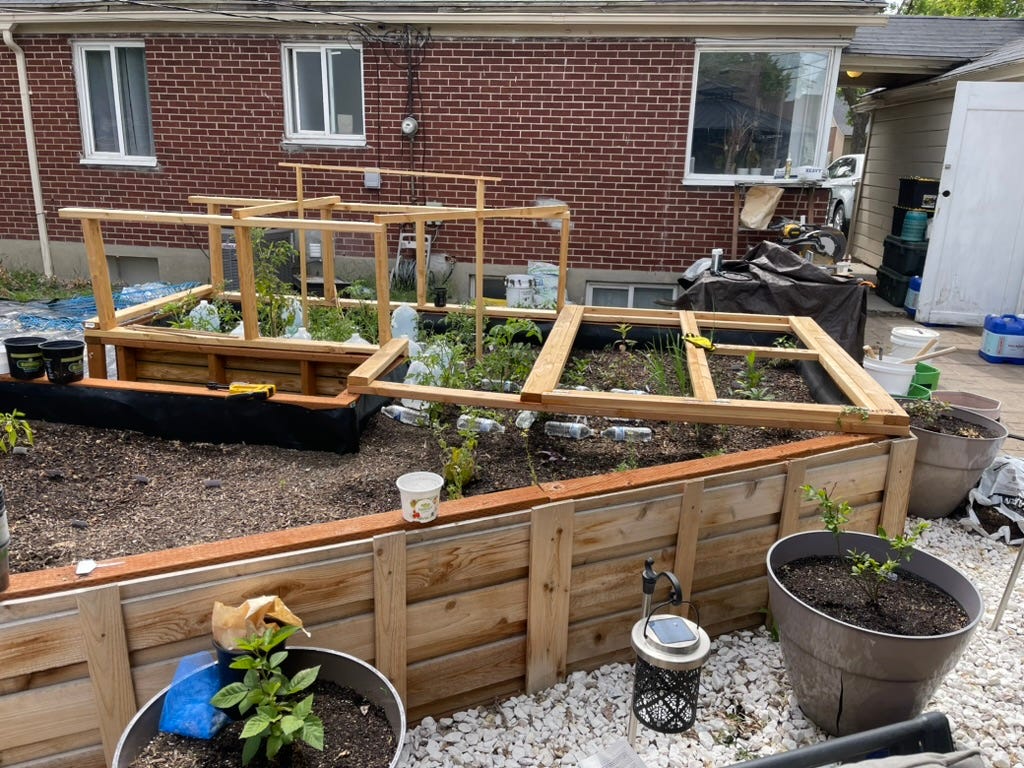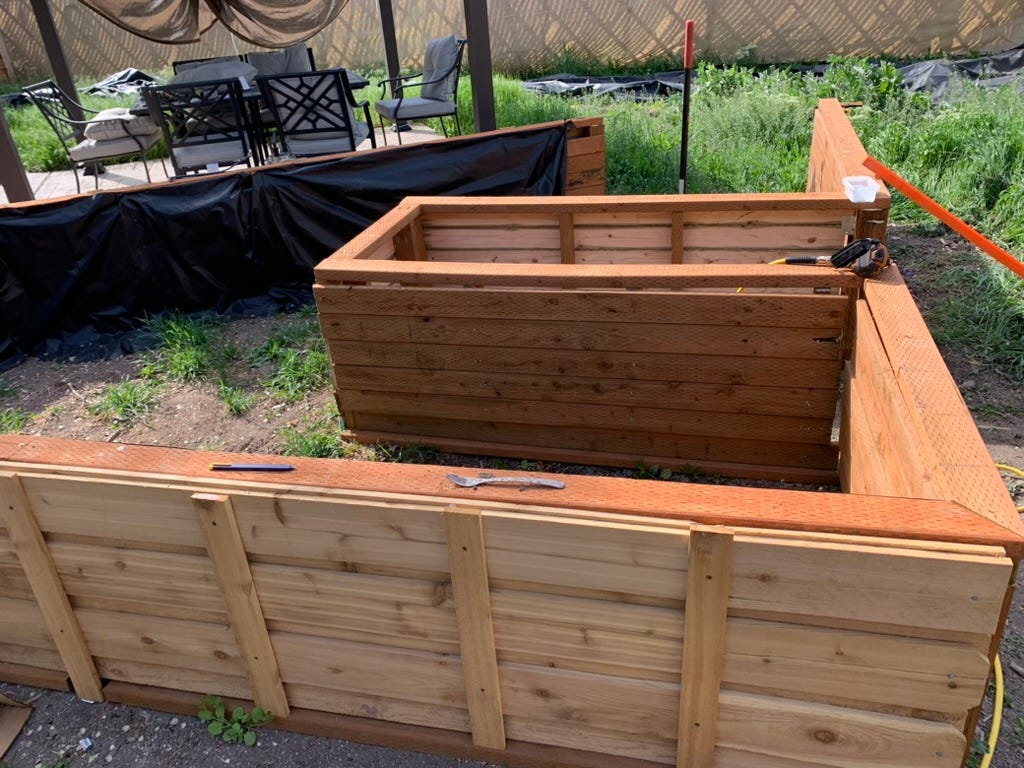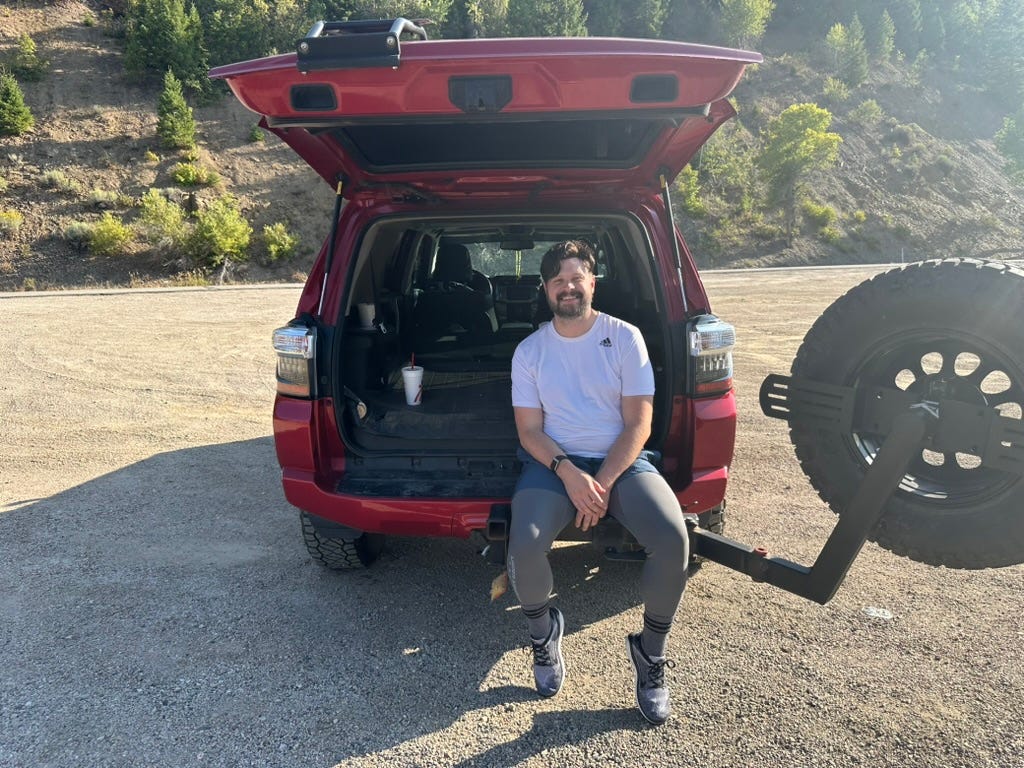I Fled and Chose at the Same Time
After my divorce, I didn’t just leave the house, I left the entire city for a place I’d always wanted
Looking back, I can see the pattern now.
After my divorce, after selling the house, after learning what it felt like to break completely apart in that basement, I didn’t just move to a new neighborhood. I didn’t find a smaller place downtown or stay close to what I knew.
I left. The entire city. The whole geography of my former life.
I moved to the countryside, a place I’d been quietly longing for since I was a child checking out library books on herbalism. A place I’d been rehearsing in raised garden beds and seed catalogs for years.
And here’s what I’ve learned since then: aliveness looks different when you’re not just breaking, but also building. When you’re not just surviving loss, but actually choosing something.
But it took me a long time to understand what that choice actually was. And even longer to admit what I was running from.
The Life I Was Rehearsing
I bought my house in the city before I got married. A third of an acre. Decent sized yard for an urban property.
I built raised garden beds.
Beautiful ones. Cedar frames, good soil, intensive planting plans. I farmed that space hard, bringing in so much of our produce that I’d have to give it away to neighbors.
I told myself I was gardening because I liked it. Because it was satisfying. Because fresh vegetables taste better.
But looking back, I can see what I was really doing: rehearsing.
Rehearsing the life I wanted in the container I had. Trying to bring the countryside to me because I couldn’t go to it.
Every season I’d flip through seed catalogs like some people flip through travel magazines, looking at places I wanted to go but couldn’t. Planning gardens that needed more space than I had. Imagining what I could grow if I just had a little more land.
A little more freedom.
The stuckness wasn’t just about the marriage. It was geographic. I was rooted down in a place I’d never fully chosen, bound by the life I’d built there.
The city felt too fast. Too dense. Too much performance required just to exist in it. But I’d bought a house there. Built a life there. Gotten married there.
So I stayed. And I gardened. And I told myself it was enough.
The Weight of Wrong Geography
The four-year conversation taught me what it costs to postpone truth. My body kept THAT score: shoulders tightening, jaw clenching, a cracked molar from grinding my teeth in my sleep.
But there was another layer of tension I didn’t recognize: I was living in the wrong place.
The performance wasn’t just about my marriage. It was about pretending I was content with urban life when my body was constantly reaching for something else.
Every time I’d drive out of the city, my shoulders would drop. My breathing would slow. Then I’d drive back, and the tension would return.
But my body knew. It had always known.
When Loss Cuts Every Root
The basement taught me what full presence feels like. It held me while I broke completely apart, witnessed my grief without asking me to manage it or make it reasonable.
But here’s what that breaking did: it severed every root that was keeping me stuck.
The divorce didn’t just end my marriage. It ended my reason for staying in the city. The house sale didn’t just liquidate an asset. It freed me from the geographic anchor I’d never consciously chosen.
For the first time in eight years, I could actually go anywhere.
And the question that rose up—the one I’d been avoiding my whole adult life—was devastatingly simple:
What do I actually want?
Not what makes sense. Not what’s practical. Not what keeps me close to what I know.
What do I want?
The answer came fast, the way truth does when you finally give it permission:
The countryside.
I’ve wanted it since I was a child. I’d been rehearsing it for years in those raised beds. My body had been reaching for it every time I left the city limits.
So when I had to choose where to go next, I didn’t choose another neighborhood in the city. I didn’t choose the practical option or the one that made the most sense for my career or my social life.
I chose the thing I’d always wanted but never let myself have.
The Honesty About Running
Here’s what I also need to tell you: I was running away.
From the density of memory. From the restaurants we used to go to. From constant reminders of the life that ended. The city held too much history. Every corner had a ghost.
I needed distance. Physical, geographic, tangible distance.
But I was running toward something too. Toward the slowness I’d always wanted. Toward the land I’d been longing for.
Both things are true. I fled and chose at the same time.
You can be escaping pain and moving toward desire simultaneously. The honesty isn’t in making your motives pure. It’s in admitting all of what’s moving you.
Would I have left if the marriage hadn’t ended? Probably not. I would have kept gardening that third of an acre, kept rehearsing, kept waiting for permission.
Loss gave me that permission. By destroying everything, it freed me to choose anything.
What Simplification Actually Means
Life became magically less complex there. The countryside just simplified things in ways the city never could.
I still had work. I was still busy. But there was more space between the moments. More room to breathe.
In the city, life had been dense. Constant. Every gap filled with stimulation or distraction.
There, I found gaps. Actual silence. Actual space.
I started buying used. Antiquing. Relying on myself more. Fixed things instead of replacing them. Grew more of my own food.
This wasn’t poverty. It was resourcefulness. A different relationship to having and wanting and needing.
The city had taught me to consume. The countryside taught me to make do.
And that simplification felt like another version of what the basement had taught me: presence.
The Practice I Didn’t Expect
The basement had taught me what it felt like to be fully present to devastation.
No performance. No management. Just: this hurts, and I’m here with it.
That was powerful. Necessary. And the most honest I’d been in years.
But here’s what I learned in the countryside: aliveness isn’t just for breaking.
The countryside taught me to be present to simplicity. To ordinariness. To the space between moments when nothing dramatic was happening.
Could I be as alive when I was antiquing as I had been when I was sobbing into that blue couch?
Could I practice that same quality of full-bodied presence when I was planting seeds or fixing a broken fence or sitting with my coffee watching the morning light?
Could I be there—really there—when life wasn’t demanding my attention through crisis?
That turned out to be harder than I expected.
Presence in devastation felt earned. Justified. Of course you’re fully alive when everything is breaking. When else would you be?
But presence in the ordinary? In the quiet? In the slow unfolding of a life you’re actually choosing?
That required something different. Not permission granted by crisis, but permission I had to give myself just because I was there. Just because it was my life. Just because I’d decided to show up.
What Came With Me
The grief traveled.
I’d thought (hoped, really) that leaving the city would leave some of the pain behind. That geographic distance would create emotional distance.
It didn’t work that way.
I still missed the house. I still had moments of devastating loss. I still carried the weight of everything that had ended.
The countryside didn’t fix that. It wasn’t actually supposed to.
But here’s what was different: I wasn’t waiting to be healed before I started living.
I was crying while building. Grieving while planting. Hurting while choosing.
The cultural script says: heal first, then live. Get through the grief. Process the trauma. Do the work. And then, once properly put back together, you can start your new life.
But life doesn’t pause while you heal. You have to do both at once.
I was practicing aliveness in a life I was still figuring out. In a place that didn’t know my history. In a container I’d actually chosen instead of one I’d inherited or compromised into.
And some days it was graceful. Other days I was a complete mess. I felt untethered. Uncertain. Like I was making it all up as I went.
But I was there. Imperfectly. Incompletely. Still breaking in places, still building in others.
And that turned out to be enough.
The Geography My Body Always Knew
Those new walls didn’t know me. That land had no memory of who I used to be or the performance I’d maintained for years.
At first, that felt like exile. But it became freedom.
I got to show up there as whoever I was in that moment. Without accumulated history. Without ghosts on every corner.
The countryside didn’t care if I was healed. Trees don’t ask how you’re doing. Fields don’t require explanations.
There was something liberating about practicing aliveness in a landscape utterly indifferent to my human drama.
And slowly, I became someone who could be honest without needing specific walls to do it in. Someone who could be present without crisis forcing it.
The basement had taught me what presence felt like. The countryside taught me I could access that anywhere.
What Running Toward Looks Like
I’ve lived in the countryside for several years now. Long enough to learn that choosing isn’t a one-time decision, it’s a practice you keep showing up for.
Some days I wake up and feel this quiet rightness, like my body finally matches my geography.
Other days I’m terrified. Lonely. Wondering if I made a huge mistake.
Both are true.
I fled the density of memory and chose the slowness I’d always wanted. I was running from pain and running toward desire. Grieving what ended and building what was beginning.
The liberation wasn’t that I got fixed. It was that I didn’t need to be fixed to start living.
Aliveness isn’t what you get after you’ve healed. Aliveness is what heals you.
The living itself. The imperfect, stumbling, right-now choosing to show up.
The countryside taught me what the basement started: You don’t wait to be alive. You choose it. Right now. Imperfectly. While still breaking. While still building.
I fled and chose at the same time.
That’s not a contradiction. That’s just what choosing looks like when you’re honest about all of what’s moving you.
About Alex
I’m Alex Lovell — political psychologist, yoga therapist, and writer.
Lived homeless. Been divorced. Survived a seven-car pileup with a semi. Fell in love with questions that don’t have easy answers. I’ve met a lot of thresholds. Even the one before death.
These days, I split my time between research, writing, and holding space for people figuring out who they are after everything shifted.
This Substack is where I make sense of things out loud.
I write for people in transition — between roles, beliefs, relationships, selves.
The ones quietly wondering, “What now?” but allergic to one-size-fits-all answers.
Sometimes I quote research. Sometimes I quote my own nervous system.
One speaks in data, the other in sensation. I’ve stopped choosing sides.
Free subscribers get weekly articles and insights (sometimes twice a week!). Paid subscribers get the Thursday Offerings, seasonal companion pages, post-nidra audio, and live slow sessions. Join me?






Dr Lovell, I have felt this kind of breaking and building back up so many times in my lifetime.
I feel that one day’s best is another day’s worst, and that’s ok.
Thank you for being such a sage and erudite voice for us all.
Kindest regards and respect
Carol Power
Johannesburg
South Africa
I've fled and I've chosen, but never both together.
I live in the countryside on a third acre lot. I have finally managed to make my garden work this summer and have given away tomatoes. I have arrived!